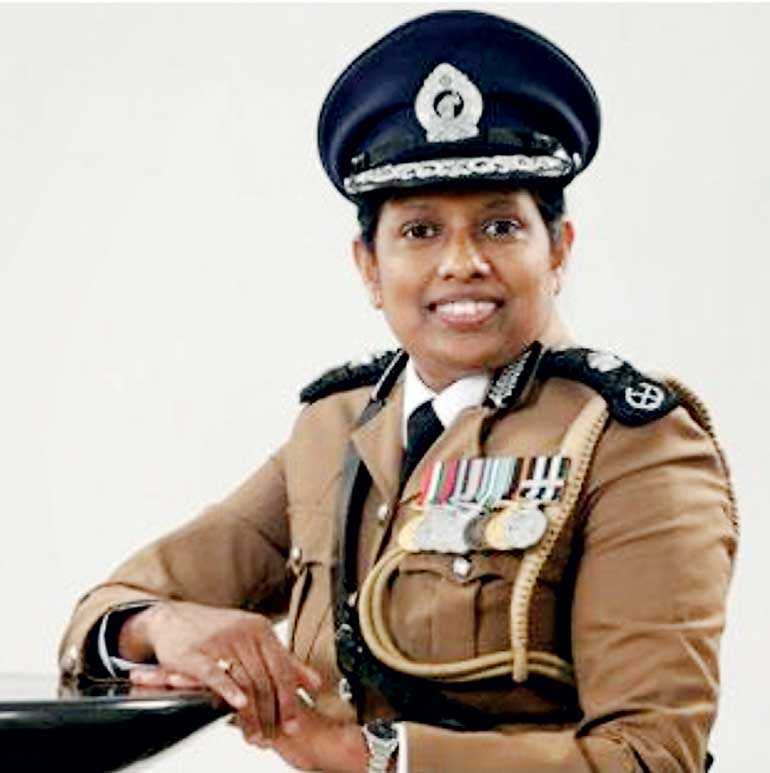Wednesday Feb 18, 2026
Wednesday Feb 18, 2026
Tuesday, 11 May 2021 00:00 - - {{hitsCtrl.values.hits}}

DIG Bimshani Jasin Arachchi
 Bimshani Jasin Arachchi is the poster girl for female inspiration and empowerment, whose appointment as the first female Deputy Inspector General (DIG Acting) of the Sri Lanka Police is now increasingly becoming uncertain. Not only is her appointment being challenged in Court but most recently the Department of Police has decided to relieve her of her assigned duties as DIG.
Bimshani Jasin Arachchi is the poster girl for female inspiration and empowerment, whose appointment as the first female Deputy Inspector General (DIG Acting) of the Sri Lanka Police is now increasingly becoming uncertain. Not only is her appointment being challenged in Court but most recently the Department of Police has decided to relieve her of her assigned duties as DIG.
Her story is one that lays bare the deeply entrenched patriarchal system and the “boys club” mentality of the Sri Lanka Police, the systemic discrimination of female police officers and the strength of male power in the societal power structures.
It is a story of how the machinations of patriarchy benefit men and deny women of their rightful positions and professional prospects. It’s a narrative about being denied your rights as a human being because you are born a woman. It’s an example of how gender discrimination happens despite having laws to protect against gender discrimination.
The Constitution of the Republic of Sri Lanka is very clear about non-discrimination. Article 12(2) of the Constitution states that “No citizen shall be discriminated against on the grounds of race, religion, language, caste, sex, political opinion, place of birth or any such ground”. However, in flagrant violation of this Article, the system of the Sri Lanka Police and the rules and regulations that govern the police force discriminate against women police officers.
Why the ‘W’ prefix?
Both female officers and male officers, once recruited to the police force, undergo the same practical and theoretical trainings and are put on the same salary scales. However, that is where equal treatment ends and male power structures take control. To begin with, there is an immediate separation based on sex by the creation of a female cadre and a male cadre.
Women officers are identified with the prefix “W’ before their designation whereas the males have no such distinguishing feature attached to their designation. Hence, a female SSP would be referred to as a “WSSP” whereas a male SSP would be plain “SSP”, automatically projecting the impression that a police officer is usually male and a female police officer is an exception.
Why does this distinction exist if they are employed in the same job and paid the same salary? In fact, the job descriptions available on the Police Headquarters website (https://www.police.lk/images/recruitment/2020/2020_01_29/asp_rank.pdf), with regard to promotions and recruitment, do not carry separate duties for men and women.
 Women’s progress limited
Women’s progress limited
As a result of dividing the force into male and female cadres, women can only progress in their careers within the structure provided for the female cadre. Within this structure there are a specific number of posts for a rank allocated for women officers and if these posts are filled women officers cannot apply for the other vacancies arising in the same rank as those are reserved for the male officers. For example, in 2020 there were eight SSP positions allocated for women officers. Once these eight positions are filled, a woman officer cannot apply for a vacancy arising in the remaining 162 SSP positions, even if she were equally or more qualified as compared to her male counterparts, because those 162 positions are reserved for the male cadre. This is grossly unfair by the women, who are forced to watch male officers in junior ranks rise above them despite they themselves being capable and qualified for promotion if only they were allowed to apply.
Shamefully, the discrimination of female police officers goes beyond the measly portion of ranks available to women. A woman’s career progression in the police force abruptly ends with that of SSP whereas men will continue to rise in the career ladder with the prospect of one day becoming the IGP.
Since the traditionally accepted and established norm is that a woman officer can only rise within the female cadre, not providing for promotions to the ranks of DIG, Senior DIG, and IGP within the female cadre has a disempowering effect as females aspire to reach these positions.
The institutional makeup of the Police Department does not recognise that, suitably qualified women officers are naturally entitled to hold any rank in the police force by virtue of being a police officer. This is precisely why the fundamental rights applications of the 32 SSPs claim that the word “woman” should be included in the promotion regulations. This is also why the Sri Lanka Police Department is now in a state of confusion as to what to do with a female DIG.
Career progression defined by strife
For the female police officers, career progression has always been defined by strife. DIG (Acting) Jasin Arachchi herself had to fight a long and arduous battle to secure her promotion to ASP. She filed a fundamental rights application in 2008, which concluded in 2013 granting her the promotion backdated to 2007.
In 2016 three WASPs filed a fundamental rights application claiming that they have no promotional prospects in the police department as the women’s cadre ends with just one SSP position. In January of 2020, eight women were promoted to the position of SSP in the background of this fundamental rights application and many appeals to the relevant authorities.
Two separate cadres benefits male officers
Clearly, the distinction of having two separate cadres benefits the male officers. It allows them to retain male dominance within the police force and keep the female numbers controlled. It creates for less competition for the male officers. The Sri Lanka Police is thus institutionally structured to retain male dominance and control female participation.
This is the type of patriarchal system that benefits the men and that is exactly what the 32 SSPs have made use of to ensure that the senior positions in the police remain within the ‘boys club’. Their fundamental rights application is a classic example of the strength of male power within societal power structures and of ensuring the continuance of a patriarchal system that favours men.
Change the regulations
The appointment of Bimshani Jasin Arachchi as the first female DIG is, as laudable as it is, a tad short-sighted. Instead of appointing her through the existing structures, which do not fully accept women, what should have been done is changing the regulations to accommodate both men and women on an equal playing field; that is, to allow women officers to compete with the male officers for the same positions. Or in the very least, the female cadre should have been revised by expanding it with a sufficient number of cadre allocations and by introducing the senior gazetted ranks into the female cadre.
Women were accepted into the police force in 1952 by the creation of a separate cadre for women. This was 155 years after the establishment of the police force, which was by then obviously a male dominated institution. Naturally, they created the female cadre ensuring that the power balance within the police structure remained with the men.
To date there has not been a significant expansion of the female cadre to a number and rank that would allow the women officers the collective power to make a meaningful change in the structure and regulations to benefit them. Effectively, the female cadre still limits the career of women in the police force so that men have more opportunities, less competition, and greater and easier access to the senior positions in the Sri Lanka Police.
And now, one woman’s promotion, which broke barriers imposed by the creation of a female cadre, has seen the men scrambling to the Supreme Court to assert their rights and has left the Police Department completely befuddled; but what of the women officers whose career progressions are being denied by a sexist administrative structure?
Patriarchal structures
What this story of a woman’s lone battle against a stronghold of the patriarchy tells us is that, we cannot afford to be secure in the achievements of a few women; that, as evidenced by the fundamental rights applications of the 32 SSPs and the most recent action of the Police Department, a solitary achievement will be challenged by patriarchal structures; that, the existence of laws prohibiting discrimination based on sex is not enough where the entire institution is controlled by men and the institutional structure is inherently patriarchal based on the premise that women are less capable than men; and that, ultimately, our human rights are not a serious matter because we are women.
We as women have to understand that it is not just about men being patriarchal. It’s how societal structures are built. It permeates through the entire society and is deep-seated in the psyche of men and sometimes women. We will have to continue fighting for our rights, resisting discrimination and calling for gender equality for years to come because what we need to do is dismantle the current structures and create a level playing field, thereby ensuring equal access to resources and professional progress for women.
[The writer is an Attorney-at-Law, Barrister (Lincoln’s Inn), LL.B (Leeds), LL.M (HKU).]